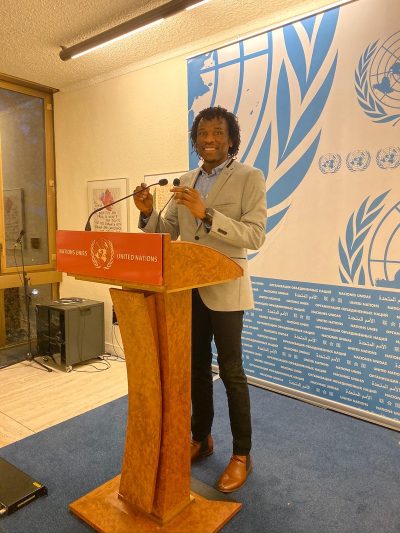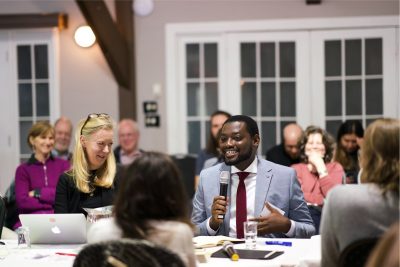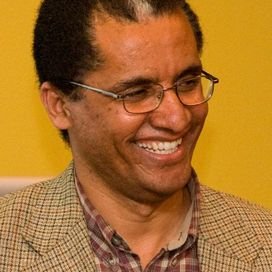By Mohamed Duale
The International Day for the Elimination of Racial Discrimination was proclaimed by the UN General Assembly in 1966 to remember the day when South African police massacred 69 unarmed people protesting in Sharpeville, South Africa, against the apartheid pass laws which managed and restricted the movement of Black South Africans [1]. Apartheid was about creating and maintaining separate and unequal worlds for different races of South Africans. When I think about what apartheid meant to do, and did, which is to create barriers between people, I am reminded about parallels to today’s securitized borders, in which fences, walls, biometric data, and detention centres have created fortresses which deny largely racialized people entry to the Global North. In reflecting on the significance of this day, I asked myself this question: what role does race play in the experience of forced migration? To answer this question, I recently spoke to three passionate Black migration activists and scholars, Abdul Aziz Adam, Carlo Handy Charles and Amanuel Melles, about their thoughts on the experiences of Black refugees around the world, and the intersection of race and forced migration. This blog explores some of the key take-aways from my conversations with them.
“You have no voice and you are on your own” -Abdul Aziz Adam – On Manus Island

Abdul Aziz Adam was a Sudanese refugee detained on Manus Island. Currently, he is a Martin Ennals Award for Human Rights Defenders laureate who advocates for rights of Black refugees and migrants. [Photo © Abdul Aziz Adam]
Abdul Aziz Adam emerged as an important voice for refugees who were incarcerated at Australia’s refugee detention centre on Manus Island. I have also been following him on social media for some time. Adam fled his home country of Sudan in 2013 after receiving threats for his involvement in student activism in his late teenage years. He eventually found his way to Indonesia where life “was very tough.” With limited possibilities for gaining status in Indonesia, Abdul Aziz soon began to wonder “how to get out of here.” Australia offered the possibility of asylum and the resumption of a normal life. Adam and his friends decided to take a boat to Australia as they had “no option but to go.” He lost five of his friends in the first attempt at reaching Australia’s coast, and was ultimately caught and detained on an Australian offshore refugee processing centre on Manus Island but which in reality functioned like a prison. Describing the experience as being akin to banishment, he noted how Australia’s “policy [is] to send people to exile without asking people why they became a refugee.” Manus Island, for him, is a place where “you have no voice and you are on your own.”
Adam described how racism and institutional and everyday forms of violence animated life on the Island and in the detention centre which held men mostly from Africa, the Middle East and Southeast Asia. The detention centre was guarded by Australian veterans of the Afghanistan and Iraq Wars, many of whom, according to Abdul Aziz, displayed symptoms of Post-Traumatic Stress Disorder (PTSD). The guards racially and physically abused, and differentially treated the detention centre’s population according to their race. “Race played a big role in the treatment of the refugees,” he recalls. The guards used racial epithets to refer to refugees. The Black refugees, who were called “gangs,” were regularly denied basic necessities, such as toiletries, given to other racial groups unless one smiled and was seen to be friendly. One of the refugees was killed by guards to set an example after protests against prison conditions. The treatment from locals on Manus Island was not much better either as many held colonial perspectives about people of African descent.
He recalled that “I found myself in a very difficult situation and I decided to take the risk of being a spokesperson for everyone on the island, to take the voice of the people out and to do my best to get in touch with the international community.”
Human rights advocacy while still an incarcerated asylum seeker was dangerous work that also came at great personal cost. He recollects, “I would do anything it takes to send everyone out of the detention centre. I did that for six years, and I never had a chance to eat well or to sleep well. I lost six years of my personal life.” Abdul Aziz was nominated for a human rights defender’s award and was eventually resettled in Switzerland in 2019. This year, he is a fellow in the Fellowship Programme for People of African Descent within the Office of the UN High Commissioner for Human Rights. Adam lives in Geneva, Switzerland, and is continuing his advocacy for refugee rights. Recently, he went to Lesbos, Greece, “to help and empower refugees by giving them a sense of understanding about the position of Europe towards refugees.” After speaking with Abdul Aziz, I was curious about how little of the scholarship within forced migration studies takes stock of the experiences of people like Abdul Aziz. I sought some answers from Carlo Handy Charles, an emerging migration scholar and former colleague at York University, whose work focuses on the function of race and racism in migration discourses.
“Bring race into refugee studies, and refugee studies into race” -Carlo Handy Charles

Carlo Handy Charles is an emerging migration scholar whose work focuses on the function of race and racism in migration discourses. [Photo © Trudeau Foundation]
Carlo Handy Charles is pursuing a joint PhD in Sociology at McMaster University and in Geography at the CNRS Laboratoire Caribéen de Sciences Sociales, Université des Antilles. He is also a Trudeau Scholar. I spoke to Carlo about how race plays itself out in forced migration and about the experiences of Haitian refugees. He started off by emphasizing the importance of putting current forced migration within a historical context that attends to the legacies of slavery, colonization and neocolonial patterns of development within contemporary globalization.
For Charles, one of the peculiarities within refugee studies is that “when people talk about refugees from the Caribbean, it’s always about the past.”
In some ways, the absence of a war in the Caribbean has hidden the ways violent social and political conditions push people out of their homes, especially in Haiti, which has for centuries suffered under neocolonial policies that have impoverished the country since becoming the first Black republic in 1804. Carlo emphasized that “we cannot talk about Haiti without race or colour,” and as such, one cannot talk about Haitian refugees without a discussion of the role played by race. When the asylum policies in the US became unreceptive in recent years, Haitian refugees, like many other refugees, started heading north, especially after Prime Minister Trudeau’s welcoming message in 2017. As Canadian Black Lives Matter activists pointed out in 2018, Canada discursively shifted from an open-door door policy to a more security-conscious posture the moment a growing number of Black refugees, particularly Haitians, started showing up at the Canada-US border [2]. His current and past research examined the ways in which Haitians in the West are ethno-racialized, pointing to the intersections of discourses of Haitian poverty and anti-Black racism. I spoke to Charles at length about the dearth of race-based analysis within refugee and forced migration studies. He argues that the problem lies in the “Western approach to knowledge, epistemology and ontology, and only what is measurable, and not the intersections.” Although “it’s a lot of work to decompartmentalize these approaches,” Carlo urged scholars “to bring race into refugee studies, and refugee studies into race.” We also talked about the experiences of Haitian refugees in Canada, many of whom came during the dictatorship of Duvalier in the 1960s and 70s. Many of those refugees are now well integrated and occupy prominent positions in Canadian society, including Michaëlle Jean, a former Governor-General of Canada. Recent generations of Haitian migrants have, however, had a more challenging time as they face precarious immigration and economic situations. We ended our conversation about the traumas of migration, the ways in which that is amplified by systemic barriers and how that can and is becoming intergenerational, especially for some of those who fled the Duvalier regime.
“Post-traumatic Community Impairment”-Amanuel Melles
After my conversation with Charles, I continued to wonder about the way racism intersects with trauma and how the experiences of refugees who came decades ago can be the “canary in the coalmine” of Black refugee integration. To satisfy this curiosity, I spoke with Amanuel Melles, a community and NGO sector leader in Canada for many years. He is currently the Executive Director of the Network for the Advancement of Black Communities, President of InterChange, a community-based peacebuilding institute, and is Past President of the Couchiching Institute for Public Affairs. I have known Amanuel for several years, having met him when I was a youth worker in Toronto. We talked at length about what African refugee integration looks like in Canada and the undercurrent of trauma among those who survived the horrors of war, particularly in the Horn of Africa, where both of us originate. Melles talked about what he called “post-traumatic community impairment,” referring to the ways in which the psychosocial impact of war and displacement makes it harder for African refugees to establish themselves in Canada. Many of those who come to Canada often leave family behind, and due to Canadian immigration backlogs, which disproportionately affect African countries, are unable to be reunited with their loved ones, in many instances, for a decade or more. This can compound prior trauma and reinforce a sense of being in perpetual waiting for family reunification. African refugees are also always playing catch-up in terms of economic integration in Canada, something which was historically and currently impeded by racism and ineffective settlement programming, challenges which can exacerbate the untreated trauma that refugees often carry.
Among Horn of Africa refugee communities, “there are high levels of suicide, and anecdotally twenty-two to twenty-five people have been lost to suicide in the last two or three years” in southern Ontario.
This is especially a problem among young men who have recently come via the Central America route, and who often have had “near death experiences” at the hands of criminal gangs, police and border guards. Amanuel said that African community organizations who have in the past tried to address these settlement and integration issues were defunded by the Harper government. Those cuts in funding, largely affecting African community organizations, came at a critical juncture when African refugee communities were facing new and significant challenges with intergenerational trauma as many of the youth began developing serious mental health issues, attempting or completing suicide, and becoming involved with the justice system. Despite sizeable funding for Black mental health in recent years, little has gone to African community organizations, largely due to a lack of organizational capacity as a result of their defunding. The funded mainstream organizations have few connections to and surface level understanding of the issues facing the African refugee communities they have been asked to serve. Melles says that despite these challenges, a new generation of African diaspora youth, “who are highly educated and easily navigating systems, are living and constructing a different paradigm [of integration].”
He argues that “it is not well understood; we still think of the challenges of the late 1980s and early 1990s” when we talk about African refugee integration.
Final Thoughts
I think an honest and critical conversation about forced migration today requires us to explore the ways in which racism structures Global North migration discourses and policies as illuminated by the experiences of Black refugees from Africa and the Caribbean, whose migration to the North is seen through the prism of crisis and security. I think often about the stories of Black refugees taking rickety boats to Europe only to be interdicted by European and EU-funded Libyan coast guards and taken to detention centres in Libya, where many are abused, [3] and some have been sold into slavery [4]. The situation of African refugees in Libya is illustrative of the fate of Black refugees globally, who face quite exclusionary, and increasingly hostile reception contexts. As we mark the 60th anniversary of the Sharpeville Massacre, I believe, now more than ever, in the urgency of racing forced migration, a project which, in the first instance, requires that we recognize how race historically and presently shapes our world, including the global refugee regime.
Mohamed Duale is a PhD Candidate in the Faculty of Education at York University, Canada. He is also a LERRN researcher and Graduate Research Fellow at the Centre for Refugee Studies.
[1] United Nations. (n.d.). International Day for the Elimination of Racial Discrimination. Retrieved from https://www.un.org/en/observances/end-racism-day
[2] Maynard, R. (2018, January 23). Do Black migrants lives matter at the U.S.-Canada border? Toronto Star. Retrieved from https://www.thestar.com/opinion/contributors/2018/01/23/do-black-migrants-lives-matter-at-the-us-canada-border.html
[3] Beaumont, P. (2019, January 21). EU support for Libya contributes to “extreme abuse” of refugees, says study. The Guardian. Retrieved from https://www.theguardian.com/global-development/2019/jan/21/eu-support-for-libya-contributes-to-extreme-abuse-of-refugees-human-rights-watch-study
[4] Baker, A. (2019, March). “It Was As if We Weren’t Human.’ Inside the Modern Slave Trade Trapping African Migrants. Time Magazine. Retrieved from https://time.com/longform/african-slave-trade/
